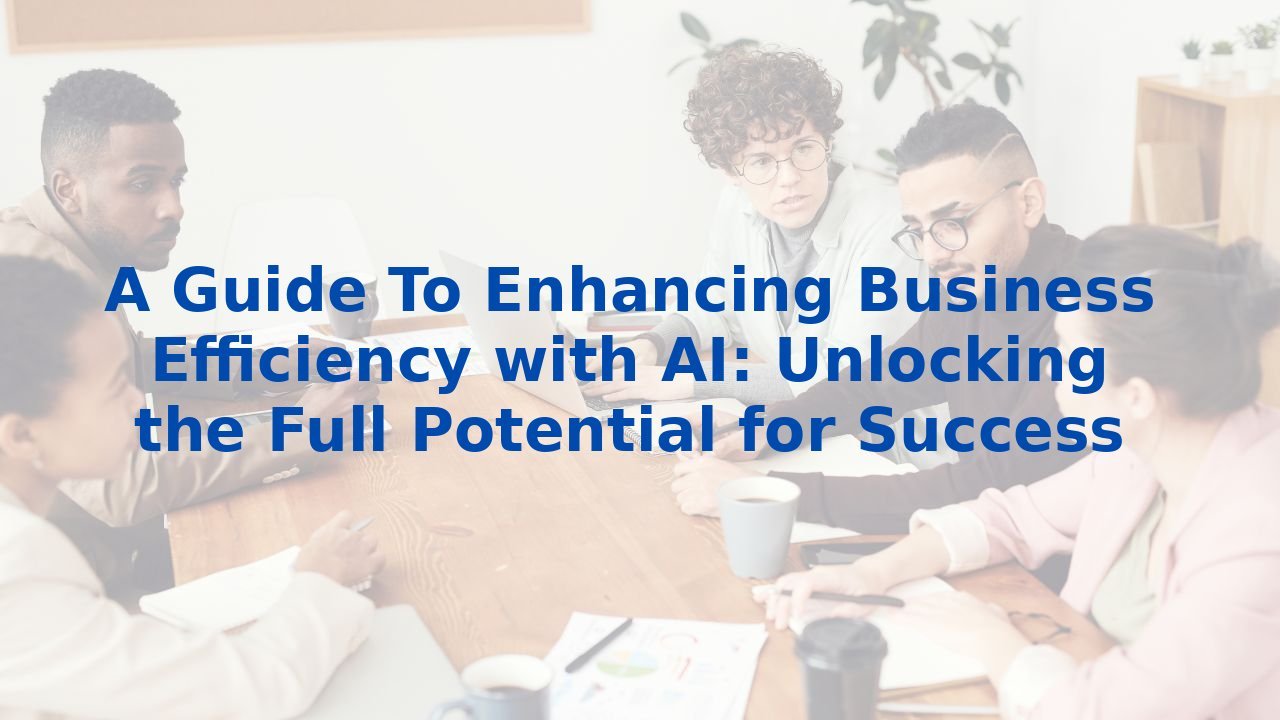A Guide To Enhancing Business Efficiency with AI: Unlocking the Full Potential for Success
A Guide To Enhancing Business Efficiency with AI: Unlocking the Full Potential for Success
In today's rapidly evolving business landscape, the ability to adapt and streamline operations is paramount. Integrating Artificial Intelligence (AI) into business processes isn’t merely a trend – it’s a transformative strategy that can redefine efficiency, productivity, and decision-making. This guide explores how AI enhances business processes and the significance of equipping your workforce with essential AI skills.
What is AI Process Optimization?
AI process optimization refers to harnessing AI and machine learning technologies to refine business process management. By analyzing data, automating repetitive tasks, and enhancing team decision-making, businesses can significantly reduce errors and elevate productivity. The primary aim? To streamline operations and maximize efficiency.
Key Benefits of AI in Business Process Management
Understanding the transformative potential of AI requires a look at its core benefits:
1. Process Discovery and Mapping
AI employs process mining and natural language processing to reveal existing company processes, constructing accurate maps that ensure documentation reflects real-time operations.
2. Process Automation
With AI bots taking over manual tasks, businesses experience diminished human error and reclaimed time for strategic initiatives.
3. Decision Support
AI can provide predictive recommendations by analyzing patterns within data. This not only aids in enhanced decision-making but also empowers analysts to develop optimal strategies without exhaustive manual analysis.
4. Real-Time Monitoring and Improvement
Continuous process monitoring through AI enables proactive management. By leveraging historical data, businesses can swiftly address potential inefficiencies before they escalate.
5. Enhanced User Experience
The introduction of AI-driven interfaces in Business Process Management (BPM) software simplifies process management, making it accessible even to those without extensive technical knowledge.
Practical Applications of AI in Business Processes
AI's versatility shines through its diverse applications:
1. Document Processing
Intelligent Document Processing (IDP) allows businesses to convert countless documents into structured data effortlessly, reducing manual workload.
2. Customer Service
AI excels at analyzing customer feedback, streamlining responses, and ensuring that client inquiries are handled with efficiency.
3. Supply Chain Management
By analyzing real-time purchase data, AI can identify anomalies and mitigate potential inventory issues, enhancing supply chain efficacy.
4. Sales and Marketing
AI analytics within Customer Relationship Management (CRM) unleash insights about high-revenue customers, while chatbots facilitate swift customer interactions, minimizing potential sales losses.
5. HR and Recruitment
In human resources, AI fosters objectivity in salary negotiations and candidate evaluations, transforms career path personalization, and automates administrative burdens.
The Importance of Employee Training for AI
Despite the myriad of AI benefits, the technology's full potential is only realized when teams are adeptly trained to utilize these advancements. Effective training programs can focus on:
1. Understanding AI Capabilities
Employees must grasp how AI automates tasks, bolsters decision-making, and drives process efficiency.
2. Data Analysis Skills
Training in data interpretation is vital for employees to extract valuable insights from AI analytics.
3. Adaptability
Workforce adaptability to evolving technologies ensures smooth transitions to AI-enhanced workflows.
4. Ethical Considerations
Education on ethical aspects of AI, including potential biases and data privacy, is essential for responsible implementation.
Investment in comprehensive employee training ensures that organizations tap into AI’s full potential, fostering sustainable improvements in productivity and operational efficiency. For organizations aiming to sharpen their AI use, consider exploring comprehensive training solutions that cater to your specific workforce needs.
Conclusion
Integrating AI into business processes marks a significant evolution in operational efficiency and decision-making. By embracing AI's multiple applications and prioritizing employee training, organizations not only unlock substantial efficiency gains but also position themselves for long-term success in an increasingly competitive marketplace. As AI technology advances, its strategic implementation will undeniably play a pivotal role in driving innovation and enhancing organizational effectiveness.
For those ready to venture deeper into the world of AI and empower their workforce with crucial AI skills, explore tailored training solutions that will enable your organization to thrive.



